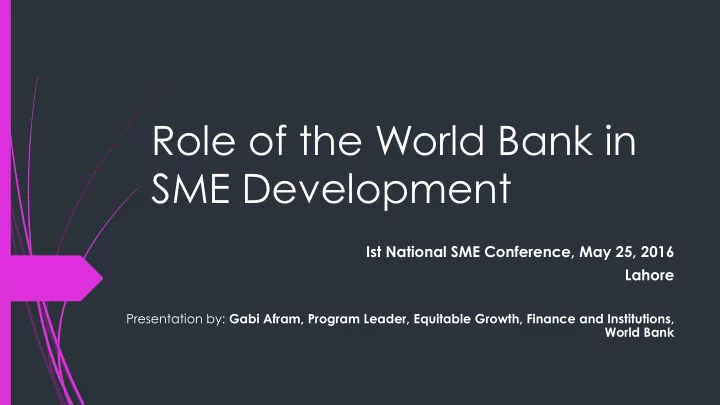

Role of the World Bank in SME Development Ist National SME Conference, May 25, 2016 Lahore Presentation by: Gabi Afram, Program Leader, Equitable Growth, Finance and Institutions, World Bank
WB Survey Outcomes – What do SMEs need? • An open and reliable ecosystem of policies and institutions; • Efficiently regulated markets and competitive product markets; • Well maintained infrastructure, openness to trade, access to finance… etc.
WBG’s SME Sector Development Activities ´ WBG seeks to promote private sector-led growth to contribute to employment creation, inclusive growth, and poverty alleviation. It promotes SME growth through both systemic and targeted interventions. ´ Why: ´ A thriving and growing SME sector is associated with rapidly growing economies; ´ SMEs face special challenges that do not apply to other sizes of firms, so addressing these challenges will “level the playing field.” ´ How: ´ Providing better access to finance as it can help firms enter the market, formalize, survive, and grow, as well as organize more efficiently; ´ Improving investment climate (e.g. stronger property rights and better contract enforcement) is linked to easier access to credit. Similarly long-term institution building, including contractual and (credit) information frameworks, helps ease SMEs’ financing constraints.
SMEs are big business for the WBG ´ SME support overall constitutes more than US$3 billion a year in commitments. Over the period FY06-12, 14% of WB projects, 28% of IFC investment projects, and 46% of MIGA projects were entirely for SME activities. ´ WBG’s support to SMEs takes multiple forms, each supporting SME growth as a means to contribute to employment creation, GDP growth, market dynamism, and/or economic inclusion. ´ The SME activities include a range of financing instruments (loans, guarantees and grants), analytical work and development policy operations.
WBG’s Global SME Portfolio
WBG Products/Activities for SME Development Global Value Chains (GVCs): The team offers an integrated approach towards the development ´ of GVCs, covering a diverse range of issues (financing, trade, infrastructure, policies and regulations, marketing, investment climate). The overall GVC development thus benefits the SMEs that have backward and forward linkages with the large manufacturers and service providers in the value chains. SME Matching Grants Projects : The financial support to crisis affected SMEs is provided for ´ immediate rehabilitation. Examples from Pakistan, Yemen, and parts of AFR. Risk Sharing Facilities : To encourage the middle tier financial institutions to offer financial products ´ to SMEs, typically in developing countries. (RSF is a bilateral risk sharing agreement) Innovations in SME Development: Using technology (e.g. branchless banking) for promoting ´ financial literacy and A2F, linkages with sophisticated financial markets to promote use of new financial products (WB Office in Malaysia, WB Islamic Finance Center in Istanbul) SME Finance Community of Practice: Learning forum for internal audience who benefit from ´ global experience of working with SMEs and also hear directly from external speakers and practitioners regarding their experiences of SME development. Recent activities: (i) SME Development Project, Mexico; (ii) Incubators in the Caribbean; (iii) Crowd Funding and Alternative Finance in East Asia and the Pacific; (iv) iSME Project in Lebanon; (v) SME Support in a Crisis Environment – the experience of Post Ebola Support in Liberia; (vi) Economic Revitalization of KP and FATA Project, Pakistan; (vii) Financial Inclusion Support Framework (upcoming)
WBG Support to Pakistan’s SME Sector Activity Name Ad Advi viso sory ry Se Servi rvice ces s and An Analyt ytics cs (ASA) (ASA) and Pro Project cts s World Bank International Finance Corporation Economic Revitalization of KP and FATA Pakistan Credit Bureau and Microfinance Financial Inclusion Support Framework UBL SME Banking Advisory Project Financial Infrastructure Support Pakistan Dairy Sector Development FSAP Development Module Pakistan and Afghanistan Corporate Governance Project Punjab Growth and Competitiveness P4R Punjab Investment Climate Karachi Growth Report HBL Rural Business Advisory Fisheries Sector ASA Pakistan Trade Facilitation Project Doing Business ASA NRSP Microfinance Bank ASA
Potential Challenges of SME support… ´ Increasing need to adapt interventions to country conditions and enterprise priorities . ´ Although finance can be a very real constraint, complementary measures may be needed to ensure that relaxing the financing constraint for SMEs does not lead firms directly into some other binding constraint to growth. ´ Hence; ´ Important to also consider business development services, value chain financing products, market linkages, innovation and R&D. ´ Enhanced focus on impact evaluation of WB interventions for SMEs. ´ Integration of SME activities in Country Partnership Strategies and Joint Investment Plans.
Recommend
More recommend